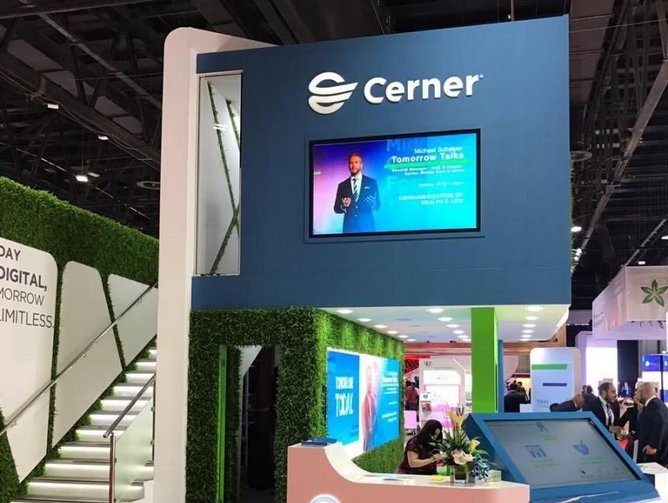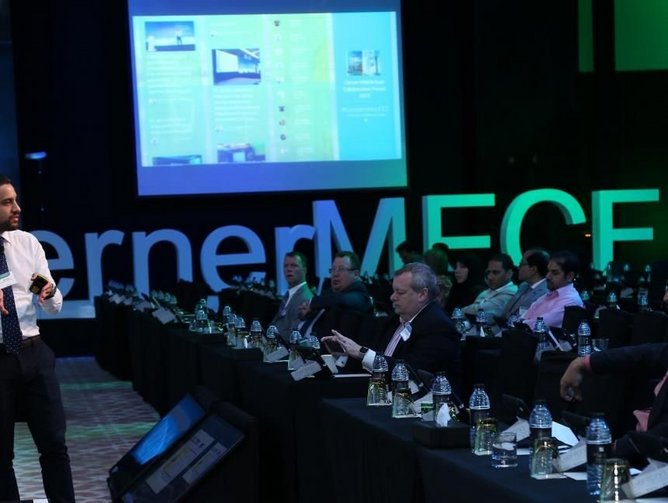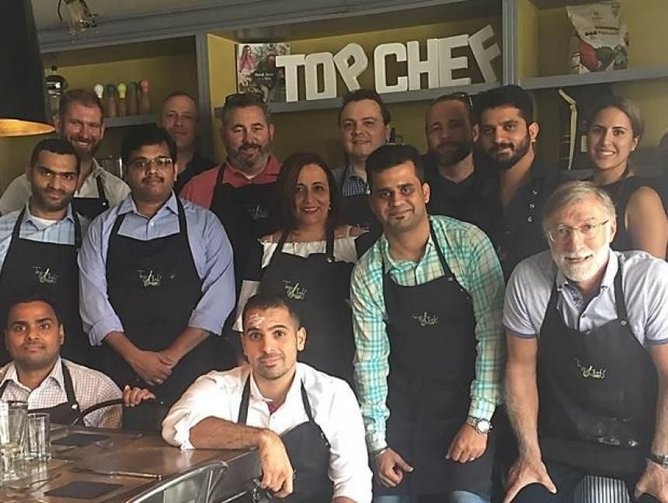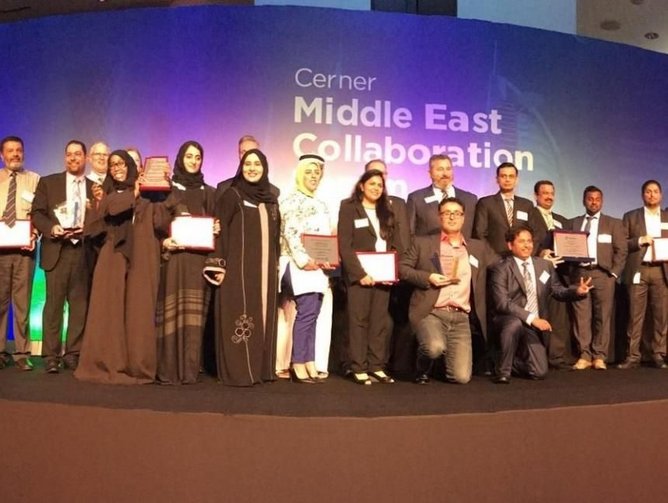Cerner, technology and the road to connected, personalised care in the Middle East
Some 30bn devices will be connected via the Internet of Things by 2020. In the space of five years, the world will have doubled its connectivity capacity in this regard. Come 2024, this will have doubled once more.
The world is more connected than ever, and companies in the Middle East and Africa (MEA) region are beginning to take advantage. According to SAP, MEA firms spent $8bn on IoT in 2017. Services, from retail and transport to utilities and finance, are becoming more connected and personalised in smart city initiatives such as that being rolled out at breakneck speed in Dubai.
“Healthcare has to become personalised too,” comments Michael Schelper, general manager for the United Arab Emirates (UAE) and Kuwait for Cerner Middle East & Africa.
“We are used to personalised services in almost every aspect of life. You can hail an Uber instantly at the touch of a button, so why should it be different with healthcare? If I want a consultation now, then I should be able to get that service on demand, and not have to wait until tomorrow or next week.
“However, the question is how new technology can make this happen – does the consultant have to necessarily be a human being? New technology is completely revolutionising healthcare and healthcare management.”
Schelper has been part of this journey with Cerner since 2009, moving from consulting roles in Germany, Austria and Switzerland to a leadership position in the Middle East four years later. His role is to ensure that public and private sector clients hit their targets while collectively developing the healthcare systems of the future.
“Healthcare is being disrupted, and we have to ensure we are the disruptors and not the disrupted,” he adds. “We have extremely visionary leaders among our clients and I am honoured to work with them and make that a reality.”
A landmark year
Cerner is a vital conduit in the journey towards smarter, consumer-led healthcare provision in the Middle East. For more than 25 years it has connected people and systems at organisations of all sizes, supporting key clinical, financial and operational needs. The Cerner Millennium® electronic health record (EHR) stores data for tens of millions of people across the region, provisioning a single patient database that can be accessed instantly by participating healthcare providers.
Last year, the Kansas City, USA-headquartered firm continued to grow its MEA footprint. “We’ve had a busy 2017 with our clients and our client list keeps growing, both on the public and private sector side,” explains Alaa Adel, general manager for Saudi Arabia and Egypt, Cerner Middle East and Africa.
“For example, we added Kings College London UAE and also had a huge engagement with the Ministry of Defence in Saudi Arabia. We are very proud of what we have helped these and other clients achieve over the past year, and look forward to hitting objectives for this coming year too.”
Like Schelper, Adel is also a company veteran who joined in 2009 and is bringing valuable experience from Cerner operations in other parts of the world, notably the “mothership” in Kansas City, where he spent five years.
Adel believes that private enterprise will, ultimately, lead the way in terms of MEA’s healthcare innovation and help governments realise this segment of their various visions for the future, whether it be UAE Vision 2021, Saudi Arabia vision 2030 or Egypt Vision 2030.
“It is crucial that private companies and governments work together in making this happen,” he says. “I think that private sector innovation will be absolutely key in helping governments to get the best value from their healthcare expenditure. Public Private Partnerships are already proving to be a model of success in the countries we are working in.”
From volume to value
Another observation Schelper makes is that, generally, the regional healthcare space is moving from a volume to value-focused proposition.
Sound financials, value delivery and patient outcomes now interoperate – this is no better demonstrated than by the widely-accepted view that clinicians need to spend their time on delivering best-in-class care and not be burdened with administrative tasks.
“In this respect, technology is absolutely the foundational, transformative vehicle,” Schelper states. “The UAE is in a unique position because its IT infrastructure is already very far advanced, and the mindset is there to take it a level higher. It is this foundation which will allow information to flow freely – we have the public sector on board and medical organisations are putting credible systems in place.”
Indeed, the UAE is currently implementing a National Unified Medical Record, a central database that will allow institutions across the country to share medical data.
“No matter where a patient goes, we have to have the right information available at the right time,” Schelper adds. “You don’t want to be in a situation where hospital A has to send files over to hospital B.”
Trust in technology
The requisite technology to deliver the likes of UAE Vision 2021 and Saudi Arabia Vision 2030 already exists. The largest obstacle to overcome, according to Schelper, is trust.
“Trust is a hugely important word,” he says. “There is currently a sense of paranoia that we need to overcome about health data if we are to achieve this vision of a totally personalised, joined-up healthcare system. We cannot lock data away in a vault that nobody has access to.”
The next step is for governments and health institutions to make the case for data sharing and convince consumers that their data will not only be safe, but could be the difference between life and death in an emergency. Schelper and Adel refer to how the likes of Apple have integrated biometric security layers into its products, like facial recognition and fingerprint scanners. This is highly sensitive data that consumers trust smartphone companies to manage – now is the time for that trust to be carried over to healthcare.
“Without that, we cannot move forward,” Schelper insists. “We want world class healthcare, but what does it take to build up credibility? For me, it is transparency. At the moment there are discussions about who should own this data. It should be you. New technology such as blockchain will play a key role in ensuring that human beings own their own data and know where it is being shared.”
Unrivalled expertise
Cerner looks set to play a pivotal role in establishing the level of trust required to fully realise the benefits of new data sharing health systems across the region. Central to this, and what Adel calls the cornerstone of the business, is a pool of medical expertise both in-house and in partnership with clients.
“Cerner has been around for nearly four decades,” he says. “We are leveraging all of the experience we have across the company to ensure our clients, both public and private, hit their objectives. We have a large number of clients that we are proud to call partners, and that network is helping to transform healthcare in the region. Cerner wants to make these government visions a reality.”
Not only does Cerner provision its own EHR, its consultants’ analytical prowess also supports clients to make the most of the data contained within both its own and other providers’ systems. Among its 24,000-plus personnel are doctors, nurses, engineers, pharmacists, technicians and more, with over 300 expert associates stationed in the Middle East.
But how is such an extensive network maintained? “This is best demonstrated by the fact that our attrition rate is under 3%,” Adel remarks. “We have offices around the world, and if someone has been at the company for 18 months they are given the right move all over our offices, whether it be the Middle East, UK, USA, Germany or Australia, to name a few. This is a big commitment and investment from Cerner, and a big incentive for employees to stay with us. We live and work in the countries we serve, so we are all the more determined to transform healthcare for the better.”
Schelper agrees that local presence is what sets Cerner apart from other providers, facilitated by a recruitment policy that, over the past five to seven years, has strongly favoured locals over expats.
The future of healthcare
Asked what the coming years have in store, Schelper is adamant that the future of healthcare in MEA is extremely bright, not only for the citizens that benefit but also medical tourists, who will continue to provide important revenue streams for various countries.
The vital next step is to apply intelligence to the swelling mountains of data being gathered by EHRs and other systems. For the UAE, already an artificial intelligence pioneer and front-runner with IBM Watson, technologies like blockchain can provide the answer, and Schelper believes this will be in play by 2020.
“At the moment we have a lot of health entities that contain data, and over time we need to connect those and bring them to the next level to inject intelligence into that data collective,” he explains.
“However, in order to reach the consumer we need a platform on top of the platform, what we call the Internet of Health and Life. This will provide the personalised experience that is so important. I want to be notified when my next vaccinations are due; that information should be integrated into my calendar. Further still, I want a drone to come to my office and drop off anything I need at a time that works for me. This may sound extremely futuristic and a bit like science fiction, but the technology to make this happen is there today.”
Cerner has a unique opportunity in the MEA region, and Schelper and Adel’s next task is to help knock down the trust barrier that could stand in way.
“We have to overcome the paranoia that surrounds data governance and establish that trust in order to make this a reality. This will allow us to connect technologies and bring healthcare management to the next level,” Schelper concludes.





